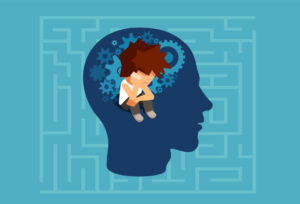Attention Deficit Hyperactivity Disorder (ADHD) can be a challenging and often misunderstood condition. One of those treatments is psychotherapy – a type of therapy designed to equip individuals struggling with ADHD to develop new strategies for managing their behavior. In this blog post, we’ll take an in-depth look at why psychotherapy should be considered when treating ADHD as well as the specific types of therapies that may work best for each person. Read on to learn more about psychotherapy for ADHD.
Contents
What is ADHD and How Does It Affect Individuals?

Attention Deficit Hyperactivity Disorder (ADHD) is a neurological condition that affects an individual’s cognitive functioning. It is characterized by difficulty paying attention, impulsive behaviors, and hyperactive behavior. People living with ADHD may find it hard to keep their focus on the tasks at hand and show signs of restlessness or irritability.
The reason behind this condition remains unclear, but recent studies have shown that it could be caused by hormonal imbalances or genetic predispositions. In some cases, premature birth and exposure to certain substances have been linked to the development of ADHD.
Symptoms for this disorder can range from mild to severe and depending on the intensity of the symptoms, it can substantially affect individuals’ academic performance, social life, work environment as well as home life. Fortunately, with psychotherapy and medication, many patients can manage their disorders and lead healthy lives.
Psychotherapy For ADHD

Psychotherapy is an important part of an effective treatment plan for ADHD, regardless of the type or severity. It can help individuals learn new strategies to improve their daily functioning.
There are many different types of psychotherapy for ADHD. Some of these include:
Cognitive Behavioral Therapy (CBT)
This type of psychotherapy focuses on helping individuals learn how to change their thinking and behavior to better manage their symptoms. It can help individuals with ADHD become more aware of the impact that their thoughts, emotions, and behaviors have on their life.
CBT also works by helping individuals identify triggers that can lead to their symptoms and create strategies for managing them. It also helps in developing a better understanding of how ADHD may be affecting different aspects of life, such as school or work performance and relationships.
Play Therapy
This type of therapy uses play activities to help children with ADHD express feelings, gain insight into their behavior, and learn new skills. It is often used with younger children because it can help them to better express their emotions in a safe and supportive environment.
In play therapy, a therapist will observe the child’s play and interact with them to help them understand their behavior. It is also used to teach children techniques for managing and expressing emotions in healthier ways.
Interpersonal Therapy
This type of psychotherapy focuses on interpersonal relationships. The goal is to help individuals with ADHD learn how to better communicate, interact and build relationships.
It also helps individuals increase their self-esteem and develop better coping strategies for dealing with stress, anxiety, and other issues that can arise due to ADHD.
Family Therapy
This type of psychotherapy focuses on the family unit as a whole. It is used to help families learn how to better support each other and manage the behaviors associated with ADHD.
Family therapy can also help to improve communication within the family and build better relationships between parents and children. This type of therapy is especially beneficial when a child is diagnosed with ADHD, as it helps the whole family learn how to handle the situation healthily.
Dialectical Behaviour Therapy (DBT)
This type of psychotherapy is designed to help individuals with ADHD become more aware of their emotions and learn how to manage them. It also teaches individuals strategies for regulating their behavior and improving problem-solving skills.
DBT works by having individuals identify their emotions and experiences, then helping them learn how to respond more productively. Therapists use various techniques such as role-playing, mindfulness exercises, and other coping strategies to help individuals better manage their ADHD symptoms.
Behavioral Interventions
Behavioral interventions are used to help people with autism focus on a specific skill or behavior. This can include using visual and verbal prompts, providing incentives for desired behavior, providing rewards for achieving goals, using a token system to reinforce good behaviors, or implementing a consistent routine.
Behavioral interventions may also involve breaking activities into smaller steps or parts to make them easier to understand. A therapist may also use modeling, which involves showing the person with autism how to do a task.
Exposure and Response Prevention
An important component of Cognitive Behavioral Therapy (CBT) is Exposure and Response Prevention (ERP). ERP is an evidence-based form of treatment that helps individuals learn how to manage their anxiety by gradually exposing them to situations or objects that cause fear or discomfort and teaching them how to respond healthily.
ERP begins with psychoeducational, which helps individuals to better understand their anxiety and how it works. Once this understanding has been established, the patient is gradually exposed to different levels of fear-inducing situations or objects in a safe and controlled environment.
Benefits of Psychotherapy For Treating ADHD

There are many benefits of psychotherapy for treating ADHD. Some of these are:
Comprehensive Treatment
One of the most important benefits of psychotherapy for treating ADHD is that it provides a comprehensive treatment approach. Psychotherapists can address the psychological, emotional, and behavioral aspects of ADHD to create an individualized plan based on each person’s unique needs.
Long-Term Support
Another benefit of psychotherapy is that it offers long-term support. It also helps individuals learn how to better manage their symptoms in the long run. Psychotherapy can provide structure and support to help individuals develop healthy coping strategies and problem-solving skills.
Supportive Environment
Psychotherapy also provides a supportive environment where individuals feel safe to express themselves without judgment or criticism. The therapist serves as a sounding board, offering feedback, guidance, and support. This can help individuals feel empowered to make positive changes in their lives.
Improved Self-Esteem
Psychotherapy can also help with improving self-esteem and confidence. It provides a space for individuals to explore their feelings and develop strategies for managing emotions more effectively. With improved self-confidence, people are better able to overcome the challenges associated with ADHD.
Increased Awareness
Psychotherapy can also help individuals become more aware and mindful of their thoughts, feelings, and behaviors. This increased awareness can help individuals better manage their symptoms and make positive changes in their lives.
Limitations of Psychotherapy For Treating ADHD
Everything has its limits and psychotherapy is no exception. While there are some successes to be had with using psychotherapy for ADHD, it does have its drawbacks.
- One issue is that the process can take a long time. Psychotherapy requires patience and commitment from both the therapist and the patient for it to be effective. This can make it a slower process than other treatments.
- Another limitation is that it may not be as effective as other interventions when it comes to reducing the symptoms of ADHD. This could be due to a variety of factors, such as a lack of thorough assessment or inadequate treatment plans.
- Finally, psychotherapy alone may not be enough for some people with ADHD. Medication or other interventions such as structured treatments and lifestyle changes may also be necessary to achieve the best possible results.
Despite its limitations, psychotherapy can still be an important part of treatment for many people with ADHD.
Sources To Find Psychotherapy For Treating ADHD

There are many sources to find psychotherapy for treating ADHD. Here are some common sources:
- Primary Care Physician: A primary care physician is often the first source of help when looking for psychotherapy to treat ADHD. They can refer a patient to a mental health professional, such as a psychologist or psychiatrist, who specializes in treating this disorder.
- Referral Services: Many referral services can be found online or in local communities and can provide referrals to qualified mental health professionals.
- Mental Health Associations: Professional associations of psychologists, psychiatrists, and other mental health providers often have lists of providers who specialize in ADHD.
- Online Websites: Many online directories list mental health professionals who specialize in ADHD. One such source is Mantracare which offers a searchable directory of ADHD therapists and counselors.
- Online Support Groups: Several online support groups provide information and resources to individuals dealing with this disorder. These can be great places to find psychotherapy providers as well as other types of support.
Conclusion
Understanding and treating ADHD is essential for those experiencing its symptoms. With the help of psychotherapy, individuals can learn to manage the difficulties this syndrome can cause concerning focus and concentration. Along with different approaches and techniques that a clinician experienced in working with ADHD may use, there are also tips people can follow to ensure they get the most out of their therapy.
With patience and perseverance, individuals work towards understanding their needs as well as discovering strategies needed to manage them—one day at a time.
For more information, please contact MantraCare. ADHD is a neurodevelopmental disorder characterized by difficulty in paying attention, hyperactivity, and impulsivity. If you have any queries regarding Online ADHD Counseling experienced therapists at MantraCare can help: Book a trial ADHD therapy session


